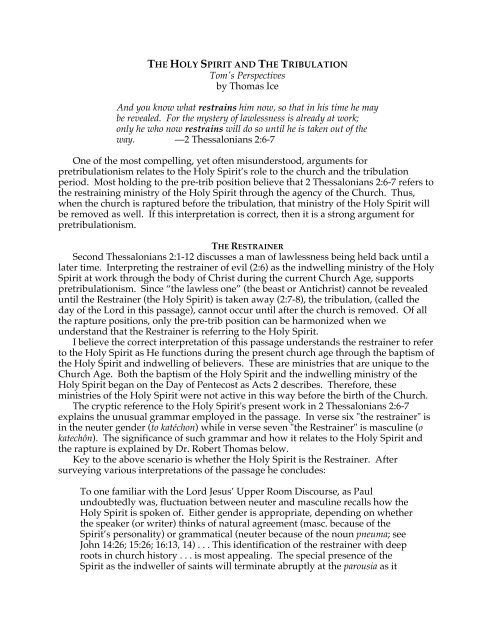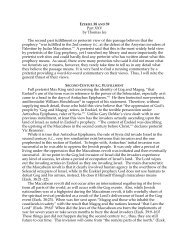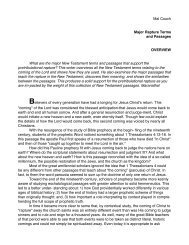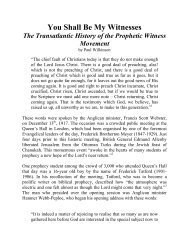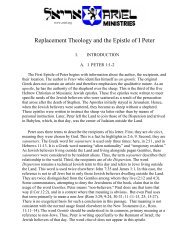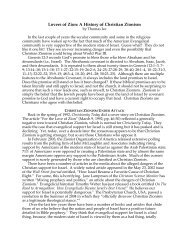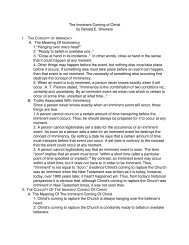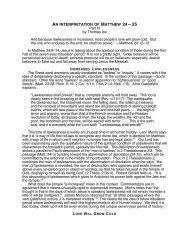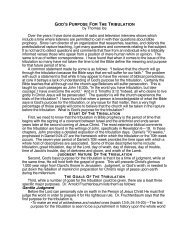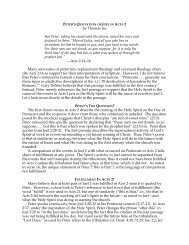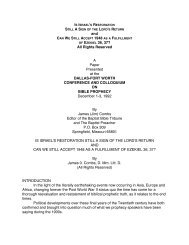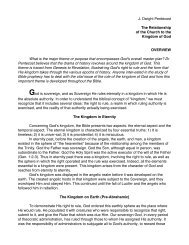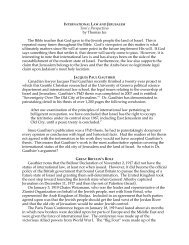H. S. & Tribulation
H. S. & Tribulation
H. S. & Tribulation
Create successful ePaper yourself
Turn your PDF publications into a flip-book with our unique Google optimized e-Paper software.
THE HOLY SPIRIT AND THE TRIBULATION<br />
Tom's Perspectives<br />
by Thomas Ice<br />
And you know what restrains him now, so that in his time he may<br />
be revealed. For the mystery of lawlessness is already at work;<br />
only he who now restrains will do so until he is taken out of the<br />
way. —2 Thessalonians 2:6-7<br />
One of the most compelling, yet often misunderstood, arguments for<br />
pretribulationism relates to the Holy Spirit’s role to the church and the tribulation<br />
period. Most holding to the pre-trib position believe that 2 Thessalonians 2:6-7 refers to<br />
the restraining ministry of the Holy Spirit through the agency of the Church. Thus,<br />
when the church is raptured before the tribulation, that ministry of the Holy Spirit will<br />
be removed as well. If this interpretation is correct, then it is a strong argument for<br />
pretribulationism.<br />
THE RESTRAINER<br />
Second Thessalonians 2:1-12 discusses a man of lawlessness being held back until a<br />
later time. Interpreting the restrainer of evil (2:6) as the indwelling ministry of the Holy<br />
Spirit at work through the body of Christ during the current Church Age, supports<br />
pretribulationism. Since “the lawless one” (the beast or Antichrist) cannot be revealed<br />
until the Restrainer (the Holy Spirit) is taken away (2:7-8), the tribulation, (called the<br />
day of the Lord in this passage), cannot occur until after the church is removed. Of all<br />
the rapture positions, only the pre-trib position can be harmonized when we<br />
understand that the Restrainer is referring to the Holy Spirit.<br />
I believe the correct interpretation of this passage understands the restrainer to refer<br />
to the Holy Spirit as He functions during the present church age through the baptism of<br />
the Holy Spirit and indwelling of believers. These are ministries that are unique to the<br />
Church Age. Both the baptism of the Holy Spirit and the indwelling ministry of the<br />
Holy Spirit began on the Day of Pentecost as Acts 2 describes. Therefore, these<br />
ministries of the Holy Spirit were not active in this way before the birth of the Church.<br />
The cryptic reference to the Holy Spirit's present work in 2 Thessalonians 2:6-7<br />
explains the unusual grammar employed in the passage. In verse six "the restrainer" is<br />
in the neuter gender (to katéchon) while in verse seven "the Restrainer" is masculine (o<br />
katechôn). The significance of such grammar and how it relates to the Holy Spirit and<br />
the rapture is explained by Dr. Robert Thomas below.<br />
Key to the above scenario is whether the Holy Spirit is the Restrainer. After<br />
surveying various interpretations of the passage he concludes:<br />
To one familiar with the Lord Jesus’ Upper Room Discourse, as Paul<br />
undoubtedly was, fluctuation between neuter and masculine recalls how the<br />
Holy Spirit is spoken of. Either gender is appropriate, depending on whether<br />
the speaker (or writer) thinks of natural agreement (masc. because of the<br />
Spirit’s personality) or grammatical (neuter because of the noun pneuma; see<br />
John 14:26; 15:26; 16:13, 14) . . . This identification of the restrainer with deep<br />
roots in church history . . . is most appealing. The special presence of the<br />
Spirit as the indweller of saints will terminate abruptly at the parousia as it
egan abruptly at Pentecost. Once the body of Christ has been caught away<br />
to heaven, the Spirit’s ministry will revert back to what he did for believers<br />
during the OT period . . . . His function of restraining evil through the body<br />
of Christ (John 16:7-11; 1 John 4:4) will cease similarly to the way he<br />
terminated his striving in the days of Noah (Gen. 6:3). At that point the reins<br />
will be removed from lawlessness and the Satanically inspired rebellion will<br />
begin. It appears that to katechon (“what is holding back”) was well known at<br />
Thessalonica as a title for the Holy Spirit on whom the readers had come to<br />
depend in their personal attempts to combat lawlessness (1 Thess. 1:6; 4:8;<br />
5:19; 2 Thess. 2:13). i<br />
Dr. Gerald Stanton cites six reasons why this passage should be understood to refer<br />
to the Holy Spirit's restraining ministry through the church.<br />
(1) By mere elimination, the Holy Spirit must be the restrainer. All other<br />
possibilities fall short of meeting the requirements of one who is to hold in<br />
check the forces of evil until the manifestation of Antichrist. . . .<br />
(2) The Wicked One is a personality and his operations include the realm<br />
of the spiritual. The restrainer must likewise be a personality and of a<br />
spiritual order, to resist the wiles of the Devil and to hold Antichrist in check<br />
until the time of his revealing. . . .<br />
(3) To achieve all that is to be accomplished, the restrainer must be a<br />
member of the Godhead. He must be stronger than the Man of Sin, and<br />
stronger than Satan. . . .<br />
(4) This present age is in a particular sense the "dispensation of the Spirit,"<br />
for He works in a way uncommon to other ages as an abiding Presence<br />
within the children of God. . . .<br />
(5) The work of the Spirit since His advent has included the restraint of<br />
evil. The Spirit is God's righteous Agent for the age, and there are many<br />
reasons to be grateful for His restraining hand upon this world's iniquity.<br />
None but the Lawful One could restrain this world's iniquity. . . .<br />
(6) It is not difficult to establish that although the Spirit was not resident<br />
on earth during Old Testament days, whatever restraint was exerted was by<br />
the Spirit. . . . (Isa. 59:19) . . . The wickedness of Noah's day and the fact that<br />
life went on as usual in blindness to impending destruction is used of the<br />
Spirit in vivid portrayal of careless and wicked men upon whom <strong>Tribulation</strong><br />
judgment shall fall. . . .<br />
In light of this Scriptural parallel, it is exceedingly significant that in the<br />
days immediately preceding the destruction of the flood, the restraining work<br />
of the Spirit is emphasized. . . . ii<br />
THE CHURCH AGE<br />
The Church began on the Day of Pentecost with a visitation of the Holy Spirit as<br />
recorded in Acts 2. The Church ends at the rapture with the translation of living saints<br />
and the resurrection of those who have died in Christ (1 Thess. 4:13-18). Until the<br />
rapture, God is gathering out from the Gentiles a people for His name (Acts 15:14) and<br />
combining them with the elect remnant of Israel (Rom. 11:5; Eph. 2:11–22) into one new<br />
body called the Church (Eph. 2:11–3:13; Col. 1:24–27). This great task is accomplished<br />
by a unique ministry of the Holy Spirit only during the Church Age called the baptism
of the Holy Spirit. Paul taught in 1 Corinthians 12:13, “For by one Spirit were we all<br />
[Jewish and Gentile Believers] baptized into one body, whether Jews or Greeks, whether<br />
slaves or free, and we were all made to drink of one Spirit.” Such a work of the Holy<br />
Spirit is only for the Church—the Body of Christ. Therefore, it is not surprising that<br />
since the tribulation cannot start until after the Church is completed and taken to<br />
heaven in the rapture that the man of lawlessness is restrained through the presence of<br />
the Holy Spirit on earth indwelling Church Age Believers. This current work of the<br />
Holy Spirit is unique to the church. Dr. John Walvoord explains:<br />
We search the prophetic Scriptures in vain for any reference to baptism of the<br />
Spirit except in regard to the church, the body of Christ (1 Cor. 12:13). While,<br />
therefore, the Spirit continues a ministry in the world in the tribulation, there<br />
is no longer a corporate body of believers knit into one living organism.<br />
There is rather a return to national distinctions and fulfillment of national<br />
promises in preparation for the millennium. iii<br />
CONCLUSION<br />
Those who do not hold to pretribulationism often mischaracterize our view of the<br />
Holy Spirit in the tribulation. They often say that pretribulationists do not believe that<br />
the Holy Spirit will be present during the tribulation. This is not what we are saying!<br />
We do believe that the Holy Spirit will be present and active during the tribulation. We<br />
do believe the Holy Spirit will not be carrying out His present unique ministry related<br />
to the Church since the completed body of Christ will be in heaven. Further, we are<br />
saying that the Holy Spirit will be present in His transdispensational ministry of<br />
bringing the elect of the tribulation to faith in Christ, even though they will not be part<br />
of the body of Christ—the Church. The Holy Spirit will also aid <strong>Tribulation</strong> Believers as<br />
they live holy lives unto the Lord. The Holy Spirit will also function to seal and protect<br />
the 144,000 Jewish witnesses for their great evangelistic ministry as noted in Revelation<br />
7 and 14 and the two witnesses of Revelation 11.<br />
The Rapture could very well be the greatest evangelistic tool in human history.<br />
When millions of people disappear from the face of the earth in a split second of time,<br />
all kinds of theories and explanations will surface. But many will remember the<br />
warnings of friends and loved ones about the truth of the Rapture. In a moment of<br />
time, they will realize what has happened. They have been left behind. God will use<br />
this mind-numbing realization to bring them to faith in His Son. The Holy Spirit will be<br />
active, as He always has throughout history, to bring the elect to salvation in Christ.<br />
Even though pretribulationists believe that many unique aspects of the current work<br />
of the Holy Spirit will cease at the rapture, it is not correct to say that we believe the<br />
Holy Spirit will not be present during the tribulation. Just as the Holy Spirit will<br />
engage in some ministries during the tribulation, relating to the 144,000 witnesses and<br />
the two witnesses, that are not occurring during the current church age, so there will<br />
cease certain ministries unique to the church which will enable the man of sin to come<br />
onto the stage of history. Maranatha!<br />
ENDNOTES<br />
i Robert L. Thomas, “2 Thessalonians,” in The Expositor’s Bible Commentary, Vol. 11, ed. Frank E. Gaebelein<br />
(Grand Rapids: Zondervan, 1978), pp. 324-25.
ii Gerald B. Stanton, Kept From The Hour, 4th. ed., (Miami Springs, FL: Schoettle Publishing Company,<br />
1991), pp. 99-102.<br />
iii John F. Walvoord, The Holy Spirit (Grand Rapids: Zondervan Publishing Co., 1958), p. 231.


